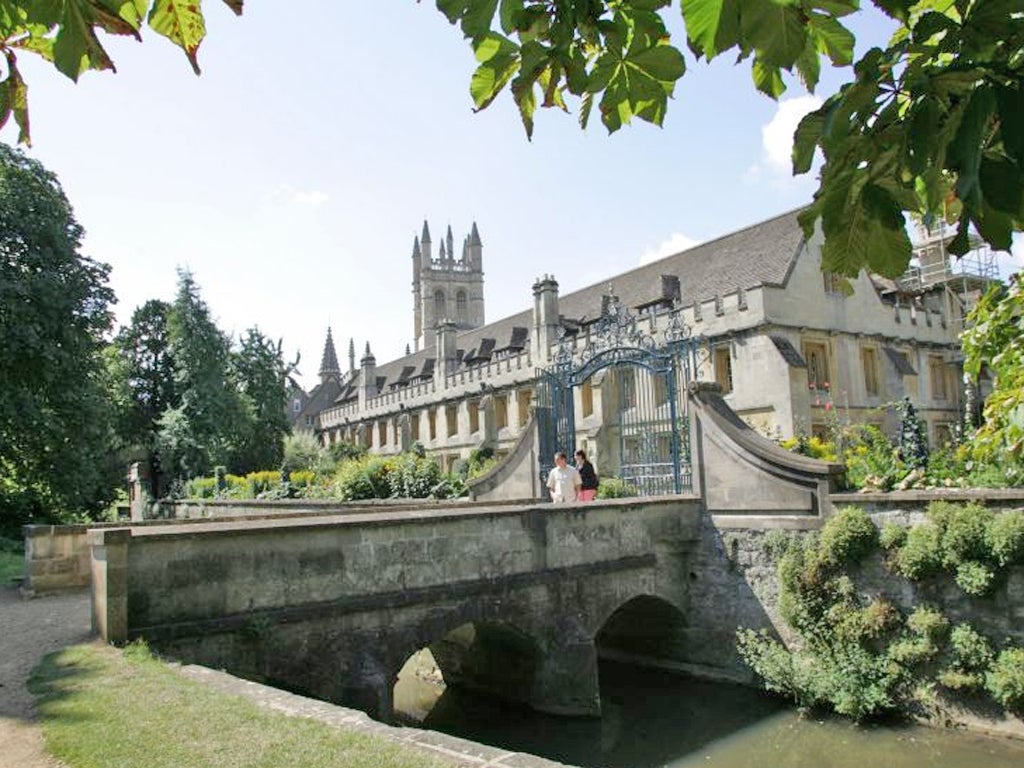The Oxbridge delusion: why the more we talk about these two great universities, the less we know
Our writer, who graduated from Oxford two years ago, says the degree of ignorance and nonsense around Oxbridge is now harming those we ought to help

Your support helps us to tell the story
From reproductive rights to climate change to Big Tech, The Independent is on the ground when the story is developing. Whether it's investigating the financials of Elon Musk's pro-Trump PAC or producing our latest documentary, 'The A Word', which shines a light on the American women fighting for reproductive rights, we know how important it is to parse out the facts from the messaging.
At such a critical moment in US history, we need reporters on the ground. Your donation allows us to keep sending journalists to speak to both sides of the story.
The Independent is trusted by Americans across the entire political spectrum. And unlike many other quality news outlets, we choose not to lock Americans out of our reporting and analysis with paywalls. We believe quality journalism should be available to everyone, paid for by those who can afford it.
Your support makes all the difference.The media has an Oxbridge obsession – mythologising it, sniping at it, venting its spleen over the Coalition at it. Along the way it has created a nightmare-ish caricature of a place populated by arsey sloanes and unhinged tweedy tutors. This portrayal of Oxbridge isn’t just ludicrous though - it’s damaging.
This week thousands of eager hopefuls are making their way to Oxford and Cambridge for their interviews. Newspapers regrettably take this as their cue to re-hash urban myths about crackpot tutors playing draconian mindgames, and cluck over ‘what to wear’ as though the candidates were auditioning for a big budget remake of Brideshead Revisited.
Minutiae
This comes on top of a year-round diet of Oxbridge news stories covering the minutiae of all things posh and trivial - from what outlandish fancy dress students are wearing, to what they look like coming out of summer balls. This year one intrepid journalist even did a Freedom of Information request into what drunken antics students had been disciplined for. Somehow these findings were spun out into double page spreads and comment pieces.
The problem with such reporting, and programmes like ‘Young, Bright and on the Right’ is that the joke isn’t just on the protagonists. Media types think they are mocking the pretentions of ‘Oxbridge twats’ – and they are – but at the same time they are peddling a distorted and deeply unappealing version of the place. If, like many prospective state school applicants, all you have to go on is the prospectus, it can easily put you off applying. It’s not just a harmless bit of populist posh-bashing.
After all, think about who takes these articles and TV programmes on board. It’s not fledgling David Camerons and Boris Johnsons sitting in Eton. They have been preparing to go since their first Latin lesson, and they don’t feel alienated by it. No, it’s the very people who need to be encouraged, who don’t have parents, teachers and the weight of expectation chivvying them along at every turn. It’s so frustratingly counterproductive.
Worse still is when journalists, comedians and television producers casually use Oxbridge as a byword for ‘elitist’ – and not elitist in the benevolent, meritocratic sense, but in the loaded dice sense. It politicises and toxifies Oxbridge, dragging it down into the national mood of resentment. The Guardian website even has a whole education section helpfully entitled ‘Oxbridge and elitism’ just in case the message ‘it’s not for people like you’ was too subtle.
The main reason for this present conflation of ‘Oxbridge and elitism’ may well be the social composition of the cabinet, but running with the stereotype of Oxbridge students as arrogant is unfair. Think how much we hear about The Bullingdon Club. The Bullingdon Club is literally 12 people at any one time. 12 people. Think how absurdly unrepresentative of the student body that is. Lots of boys asked to do it aren’t even interested – hardly anyone at Oxford cares about it. To all but the press, and people who hate Osborne and Cameron, it’s an irrelevance.
A self-fulfilling prophecy
Apart from the odd plaintive admissions tutor, no one ever bothers to say that the vast majority of students don’t have trust funds, right wing views or ancestors who have been going since the 13th century. It’s important for prospective applicants to know that and yet, sadly, they don’t.
Cambridge’s proportion of state school undergraduates is the highest it has been for 30 years and it spends £2.7 million a year on schemes to encourage more. Oxford has a bursary that keeps tuition fees down at £3,500 for the poorest students. Both universities are committed to upping their state school intake, and Mike Sewell, the new head of Cambridge admissions, says that his job is a process of chipping away at ‘out-of-date attitudes’. Would he have such a task if the press were more responsible?
And it could become a self-fulfilling prophecy. The more these misconceptions and caricatures are propagated, the more underprivileged applicants will believe they wouldn’t fit in. What is really worrying is that the teachers believe it too. At Oxford, state pupils make up 58 per cent of new entrants and at Cambridge it’s 63 per cent. Yet, according to The Sutton Trust, a tiny 7 per cent of state school teachers realise that over half of Oxbridge intake comes from the state sector. That’s a frightening amount of misinformation.
Perceived barriers are just as important as actual ones and Oxbridge is not the villain here. Let’s call a moratorium on the Bullingdon Club, on interview myths and all this inverse snobbery. This media circus makes state school applicants the real victims.
Disagree? Read Tom Mendelsohn's response here.
Join our commenting forum
Join thought-provoking conversations, follow other Independent readers and see their replies
Comments